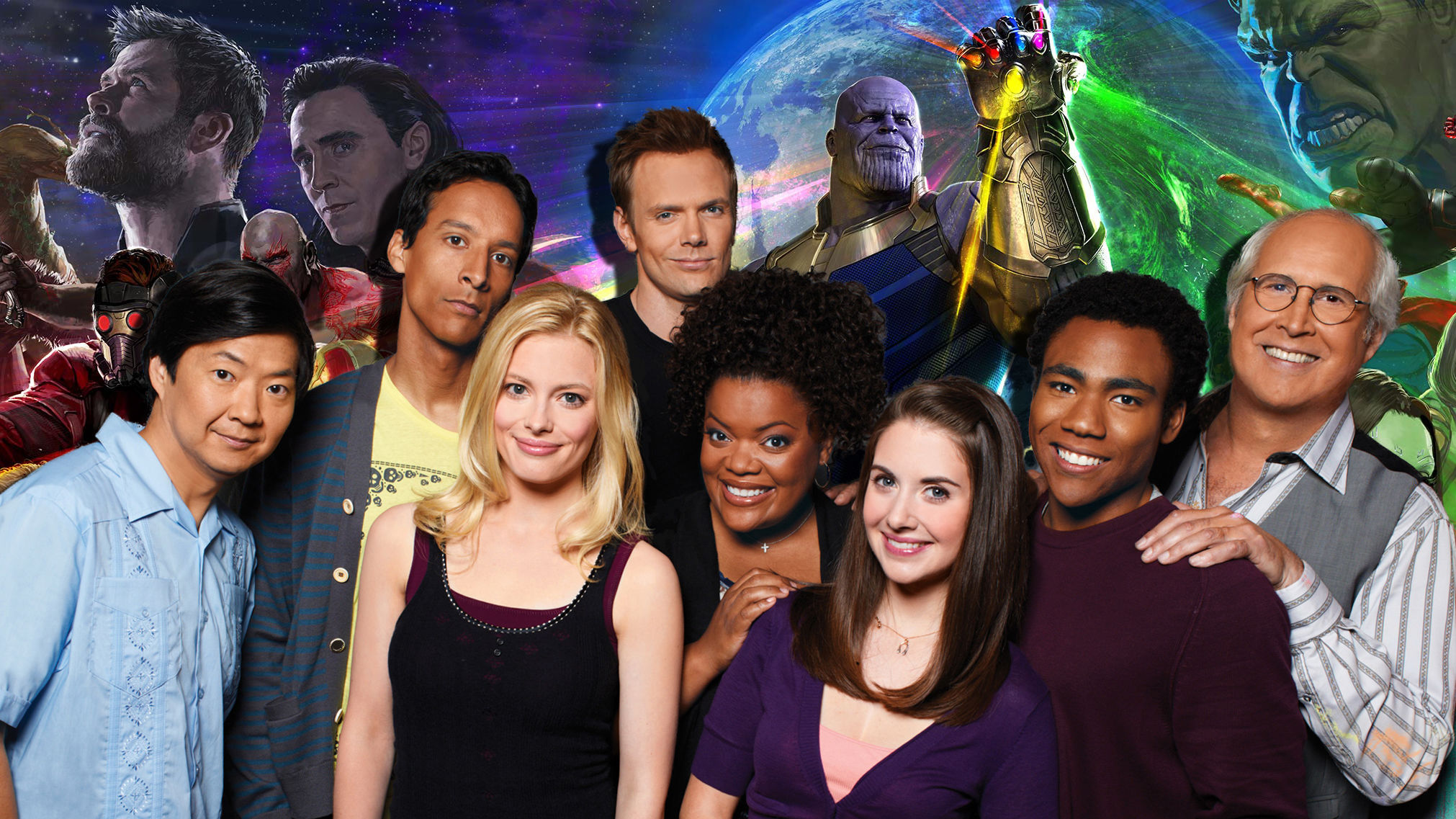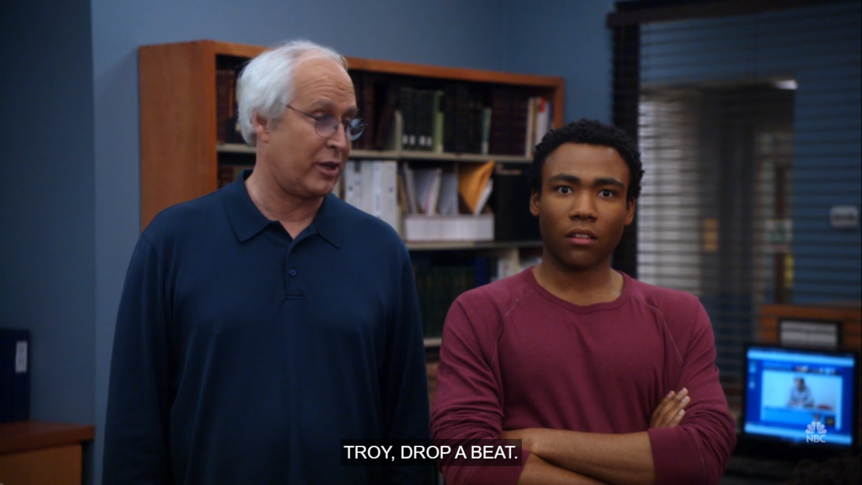Create a free profile to get unlimited access to exclusive videos, sweepstakes, and more!
Community was basically the Russo Brothers' Avengers before The Avengers

Ten years ago, on September 17, 2009, the world was graced with the pilot episode of the cult-classic Community, from fractious showrunner Dan Harmon and executive producers Joe and Anthony Russo. Today, of course, you probably know those producers better as the celebrated directors behind a run of Captain America movies and then Avengers: Infinity War and Avengers: Endgame, but there was a time when their success within the big-budget world of the Marvel Cinematic Universe was less than assured.
What, after all, could two directors known primarily for their work on critically-acclaimed but low-rated sitcoms bring to the world of laser-firing superheroes?
Everything, it turns out. Because Community was a testing ground for the Avengers franchise that the Brothers would soon helm, a straight-up rough draft of their time in the MCU. And while we understand that Community was ultimately (for most of the time) Harmon's brainchild, the Russos' deep involvement in the series, as producers and directors, makes it impossible to ignore the many, many examples of the divergent properties' similarities.
Community's de facto leader Jeff Winger (Joel McHale), is, essentially, Tony Stark, a clever and charismatic asshole who, by almost all metrics, should be a villain. And yet his growth and eventual redemption make up the heart of the franchise.
Alison Brie's Annie Edison, meanwhile, is Captain America, a do-gooding rule follower who grows into a sex symbol, and whose oft-contentious relationship with our primary hero takes center stage in several installments.
Yvette Nicole Brown's Shirley Bennett, meanwhile, is Hawkeye: consistently underestimated, loaded with deadly barbs, and constantly concerned about her family. Britta Perry (Gillian Jacobs) is Thor, a sarcastic outsider with a not particularly high opinion of humanity. (Her "I lived in New York" catchphrase is basically Thor's "Back on Asgard...") And Black Widow's jumpsuit is filled by Jim Rash's Dean Craig Pelton, a not-always-well-written character and master of disguises, played by an award-winner.
The Hulk, meanwhile — both the "Hulk smash!" and Hulk smash varieties — can be found in Chevy Chase's Pierce Hawthorne. He's both a sad and lonely man capable of turning into a rage monster at a moment's notice, and someone who thinks he's the smartest guy in the room, prone to declaratively spouting theories that don't make a ton of sense upon closer inspection. (We understand the yawning gap between Chase and Hulk actor Mark Ruffalo as people, fear not.)
Abed Nadir (Danny Pudi) pulls double duty as Vision and Ant-Man, both as an emotionless repository of knowledge who learns to love and be human — a character arc that really started in Captain America: Civil War and not the Joss Whedon-directed Age of Ultron — and also as the comic relief that ultimately brings the multiverse into the franchise.
Finally, Donald Glover's Troy Barnes is pretty clearly the Winter Soldier, a capable and layered character that is nonetheless only seen as another hero's best friend, who ultimately leaves the team and gets his own TV show. (And, even though he didn't play a large part in the Russos' Avengers movies, it's worth pointing out that Ken Jeong's Ben Chang is basically Loki, the enemy turned occasional ally prone to sowing chaos.)
But the similarities don't stop there. Let's take a look at some of the plots of the Russo Brothers' MCU contributions, shall we?
In Captain America: The Winter Soldier, the Russos' first Marvel movie, it's revealed that HYDRA, a covert and ancient group of fanatics, has been pulling strings behind-the-scenes for decades, a disclosure that sends everything into chaos. Drop the comic book trappings and it's exactly the overarching plot of the third season of Community, wherein it's revealed that the AC Repair School, a covert and ancient group of fanatics, has been pulling strings behind-the-scenes for decades, a disclosure that sends everything into chaos.
Or, if that's too broad for you, there's "For a Few Paintballs More," the second half of the second-season finale, directed by none other than Joe Russo. In addition to another secret infiltration, the episode is also heavily inspired by a famous '70s film (Three Days of the Condor/Star Wars) and prominently features a super weapon (helicarriers/a paintball-firing Gatling gun hidden in an ice cream truck), a one-off kiss that's never mentioned again, and a good guy-turned-bad guy (Bucky Barnes/Pierce) whose redemption is left in doubt.
Captain America: Civil War finds our heroes fractured along ideological lines, a near-constant story in Community, perhaps best exemplified by "Cooperative Calligraphy" (directed by Joe Russo), wherein our heroes are literally stripped down, divided into two groups, and shouting at one another. Avengers: Infinity War and "A Fistful of Paintballs," the first part of that second-season finale, both follow a one-man force of destruction (Thanos/the Black Rider) who chews through our heroes, leaving them to confront their worst fears.
And then there's Endgame, the movie that introduced the notion of a multiverse to the MCU by explaining that the removal of an Infinity Stone from the primary timeline would cause a new one to branch out. Fans of Community might note that this is an astoundingly similar conceit to the multiple branching timelines that stem from the roll of a die in "Remedial Chaos Theory."
But that's not all: Endgame's climax features a number of previously-defeated heroes appearing from circular portals to save the day, which is also the how climax of the Joe Russo-directed, mock U.N.-themed "Geography of Global Conflict" plays out.
Thor's much-ballyhooed arc of depression and redemption, meanwhile, was lifted wholesale from the arc of Neil (Charlie Koontz) in "Advanced Dungeons and Dragons" — directed by, you guessed it, Joe Russo. In both stories, a depressed and overweight warrior is struggling, hoping to redeem himself through the vanquishing of his foe. Along the way, he loses his iconic mystical weapon and has to prove himself worth to get it back, before ultimately making a new group of friends. Also, there's a lot of unnecessary fat jokes at the depressed hero's expense. It's Thor's Endgame plot, essentially.
This is, of course, just the tip of the iceberg. Community was famous for jumping genres with ease, not unlike the Russos' ability to infuse the MCU with homages to '70s spy thrillers, The Leftovers, and heist flicks. And because life isn't all sunshine and rainbows, there's also the questionable handling of LGBT characters in both franchises, and an utter lack of Hispanic representation.
It's in "Paradigms of Human Memory," though, where the executive-producing Russos truly show their hand, with Jeff straight-up saying, "I believe it's the universe's way of molding us into some kind of supergroup."
Troy brings up the analogous Traveling Wilburys — but I think we all know what group of super people he was actually talking about.















